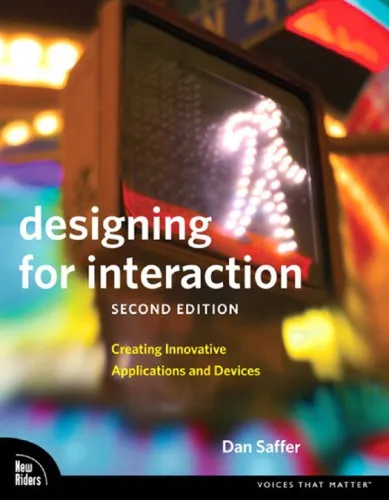The Design of Everyday Things - Revised and Expanded Edition
5.0
Reviews from our users

You Can Ask your questions from this book's AI after Login
Each download or ask from book AI costs 2 points. To earn more free points, please visit the Points Guide Page and complete some valuable actions.Related Refrences:
Persian Summary
Welcome to the intriguing world of design, where the everyday intertwines with subtle artistry and intuitive functionality. "The Design of Everyday Things - Revised and Expanded Edition" by Don Norman unravels the intricacies behind the objects we interact with daily, infused with enhancements that reflect ongoing advancements in design thinking and user-centric solutions.
Summary of the Book
The revised edition of "The Design of Everyday Things" delves into the essential principles of design that facilitate seamless and intuitive experiences with objects. Norman introduces the reader to fundamental concepts such as discoverability, feedback, and the critical role of user-centered design. By examining common objects like doors and phones, the book unveils the often overlooked challenges in design that lead to user frustration and inefficiency.
With numerous examples and anecdotes, the author guides readers through the pitfalls of poor design while showcasing exemplary models that successfully integrate user needs. The text meticulously explores the relationship between design and usability, emphasizing the significance of affordances and signifiers in making products more accessible. This edition also integrates modern design challenges posed by technology, addressing issues in digital interfaces and the growing necessity for responsive design strategies.
Key Takeaways
- Understanding the vital role of human-centered design in creating intuitive and usable products.
- The importance of feedback loops and visibility in reducing errors and enhancing user satisfaction.
- The need to recognize constraints and affordances in fostering an intuitive connection between users and objects.
- Recognizing the iterative nature of the design process and the value of prototyping and testing.
- The impact of emotional responses on user interaction and the significance of designing for pleasure as well as functionality.
Famous Quotes from the Book
"It is not our fault. It is the fault of design." This statement encapsulates the philosophy that blames errors not on the user but on poorly designed systems.
"When you have trouble with things—whether it's figuring out whether to push or pull a door or the arbitrary vagaries of the modern computer and electronics industry—it’s not your fault." Norman insists that good design eliminates user faults.
Why This Book Matters
"The Design of Everyday Things" continues to be an essential read for both designers and those intrigued by the mechanics of daily interaction with objects. In this revised edition, Norman responds to the dynamic landscape of design, emphasizing the need for adaptable, human-centered approaches. As technology rapidly advances, the principles outlined in the book remain a cornerstone for industries striving to harmonize functionality with user experience.
The insights provided have permeated beyond design into areas such as marketing and psychological user analysis, reflecting the broad influence of Norman's work. This book challenges professionals to rethink how interfaces and products are crafted, advocating for a world where everyday things are not just tools but partners in daily life.
Free Direct Download
You Can Download this book after Login
Accessing books through legal platforms and public libraries not only supports the rights of authors and publishers but also contributes to the sustainability of reading culture. Before downloading, please take a moment to consider these options.
Find this book on other platforms:
WorldCat helps you find books in libraries worldwide.
See ratings, reviews, and discussions on Goodreads.
Find and buy rare or used books on AbeBooks.
1754
بازدید5.0
امتیاز1
نظر98%
رضایتReviews:
5.0
Based on 1 users review
moji
Oct. 23, 2024, 2:16 p.m.
این کتاب یکی از اساسی ترین کتاب ها در زمینه تجربه کاربری هست که ابتدایی ترین (ممکنه به نظر ساده برسند ولی خیلی خیلی مهم هستند) اصول رو به شما آموزش میده و به شما برای درک و آشنایی بهتر با ضعف های طراحی مهندسی و نحوه برقراری ارتباط مابین کاربر و محصول کمک میکنه. اگر ترجمه های فارسی این کتابو خوندید و راضی کننده نبوده حتما نسخه انگلیسیشو بخونید چون بعضی جاها انتقال مفهوم جملات توی ترجمه ها واقعا ضعیف بودند
Questions & Answers
Ask questions about this book or help others by answering
No questions yet. Be the first to ask!









